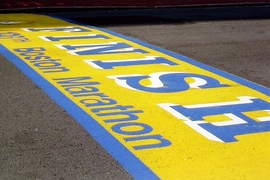An MIT Police Officer running for a fallen comrade. An undergraduate student who came to know Officer Collier, became his friend, and climbed mountains with him. A staff member who had just crossed the finish line when the first bomb exploded.
The MIT Strong marathon team has come together with 35 runners — and as many motivations for taking on the 2014 Boston Marathon on behalf of the MIT community and in honor of murdered MIT Police Officer Sean Collier.
"After the tragedies of last April, MIT needed to be part of this year's marathon," says Sally Miller ’16, one of the volunteers organizing the team. "We want to remember Sean, and we want to show the world that MIT Strong is part of Boston Strong."
MIT Strong was formed in January, after the Boston Athletic Association provided 25 invitational entries to establish the team. Ten additional members of the MIT community who already had an entry of their own also signed on, bringing the team roster to nearly three dozen.
See the full list of team members.
The runners come from every corner of campus and all across the country. "The team has graduate and undergraduate students, alumni from last year and from 50 years ago, faculty from several departments, and staff from all over MIT," says Tom Gearty, editorial director in MIT Resource Development and one of the team's organizers. "We have a sophomore and a submarine commander. But they share a common goal: to finish the marathon and raise money for the Collier Fund at MIT."
The organizers say the team is off to a strong start, despite training in a particularly harsh winter. The runners have already raised more than $20,000 for the Collier Fund. To sponsor a runner or make a team donation, visit http://mitstrong.mit.edu. Their individual stories show that the MIT community was affected by the bombing and murder in numerous ways.
Running for a fallen comrade
As someone who ran track and field for four years in high school and four years in college, MIT Police Officer Bill King always wanted to run the Boston Marathon. "But I never really had the guts to train for it," he says.
Instead, he became deeply involved in racing road bikes, eventually reaching a semiprofessional level as a competitor. But after the bombings and the murder of his fellow officer, King knew he would return to running this April. "I found the ultimate motivation to finally train for the Boston Marathon," he says. "I will run the Boston Marathon representing the MIT Police Department and in honor of our fallen brother, Sean Collier."
Family at the finish line
For Christine Meagher, an administrative assistant in MIT Resource Development and a former Division I cross-country athlete, running and the marathon are part of the fabric of life. She has watched her father run the race eight times, her uncle has been the finish-line coordinator for the past 17 years, and she has volunteered with other family members at the finish line numerous times.
Last year, after crossing the Boston Marathon finish line for the first time as a runner, Meagher was watching her brother and sister complete the race when the explosions occurred. "The loudest explosion happened right across the street from me, right where my dad and two uncles were standing when I finished," she says. "I tried to run to the scene, but two volunteers escorted me away."
Meagher spent a traumatic three hours in the medical tent with her brother, trying to learn if her father and other relatives were unharmed. All came through the bombings unscathed.
"I am so honored to run this Boston for the innocent victims and others whose lives were affected," Meagher says. "I want to dedicate my run to the heroes of those horrific events, especially for my Uncle Tommy and for Sean Collier. This Boston Marathon will be an emotional and proud day."
Honoring Sean — and learning from him
John Cunniffe, who works as a second class engineer in MIT's central utility plant, has run five marathons — but he's finished just four. At last year's Boston Marathon, he was about to take the turn onto Boylston Street for the final four-block dash to the finish line when his race ended. "I was actually stopped on Hereford Street when the explosions started," Cunniffe says.
Joining the team with his own entry from the Boston Athletic Association, Cunniffe hopes both to honor Officer Collier and to learn from him. "It would be an honor to remember Sean by dedicating my race to him,” Cunniffe says. “Sean was known for how he intermingled within the MIT family. I want to honor Sean by trying to be a little like him, by becoming part of something that is outside my normal MIT role.”
A runner whose research could make cities safer
Dogs are very effective at sniffing out bombs because their noses are astonishingly sensitive. Graduate student Joseph Azzarelli says running the marathon will inspire his research to improve public safety with technologies that mimic dogs’ natural ability. His vision, he says, is of networks of low-cost sensors that could make attacks like the Boston Marathon bombings more difficult to carry out.
"With the help of my colleagues, I aim to enable widely distributed, wireless, real-time explosives detection in cities, parks, and major metropolitan throughways," says Azzarelli, a PhD candidate in chemistry in the laboratory of MIT professor Timothy Swager, a pioneer in sensors to detect explosives. "Perhaps we can create a future where incidents like those that occurred at the Boston Marathon can be mitigated before they manifest themselves."
A warm friendship earned through freezing hikes
Those who knew Officer Collier say that he had a remarkable ability to connect with people on campus. But some team members came to know him in the deep and personal way that only comes from hiking to the top of a mountain together in the dead of winter.
Runners Maddie Hickman ’11 and Sally Miller ’16 were fellow members of the MIT Outing Club with Officer Collier. He enjoyed outdoor activities, they say, and especially winter hikes in the White Mountains of New Hampshire.
"I met Sean last year, and we quickly became friends," says Miller, a mechanical engineering major. "After going on many hikes in the fall and winter, we went to Newfoundland over spring break. He was a truly friendly, funny, and caring person, and I feel extremely lucky to have known him."
Maddie Hickman has stayed active in the Outing Club since her graduation in 2011. She became friends with Officer Collier, she says, when he introduced himself to ask about hiking after seeing her on campus with a backpack. Hickman and Miller, both first-time marathoners, say they are eager to add the marathon to their list of outdoor activities this year.
"It means a lot to me to be able to run the marathon in his name, particularly as part of a community for which this means so much," Hickman says. "It’s been really nice to feel the love and support in Boston and at MIT over the past year, and the Collier Fund seems like a great way of doing something positive in Sean’s memory."
Faculty going the distance
Team members Alex Slocum and Dava Newman are MIT professors and alumni. Each holds three degrees from MIT, and each is a very active member of the MIT community. Both say they were gravely affected by Officer Collier's murder on the campus they have loved for decades.
"Like many others who interacted with Sean, I was deeply impressed with him, and deeply hurt by his savage and tragic death," says Slocum, a professor of mechanical engineering.
And running the marathon seems a natural choice for a teacher who often runs with his advisees and students as an alternative to meeting in an office. "I feel running is one of the most pure ways we can connect with our past and live for the future," he says. Slocum has put in the miles to back up his beliefs, with an athletic resume that includes 13 Ironman Triathlons, numerous half-Ironman races, and more than a dozen marathons.
Dava Newman, a professor of aeronautics and astronautics, calls the week of April 15, 2013 “the saddest week I have shared with MIT students and our community." Newman lives in undergraduate dormitory Baker House as its faculty housemaster. "As an MIT Boston Marathon team member, I hope to be part of the larger effort to help lead our MIT community beyond the tragedy of 2013 and to celebrate life and hope."
Aiming for April
MIT Strong runners are continuing their training through the winter to be ready to run 26.2 miles on race day, April 21. In addition, team members who received their entry from MIT Strong have committed to raising $4,000 each in support of the Collier Fund, established to carry forward Officer Collier’s legacy of support for the MIT community. Runners with an entry from another source pledge to raise $1,000 each.
While some MIT Strong runners are experienced marathoners, many have never run more than a 10K before. All of them, however, have kept training through a nasty New England winter for one of the most challenging marathon courses in the world because they share a common purpose. “I am inspired every day by the MIT community,” says team member and Brain and Cognitive Sciences department head Jim DiCarlo. "I hope to use running to support the community and all those who have served and continue to serve it.”
Students, faculty, staff, and alumni to represent MIT at the 2014 Boston Marathon
Publication Date:
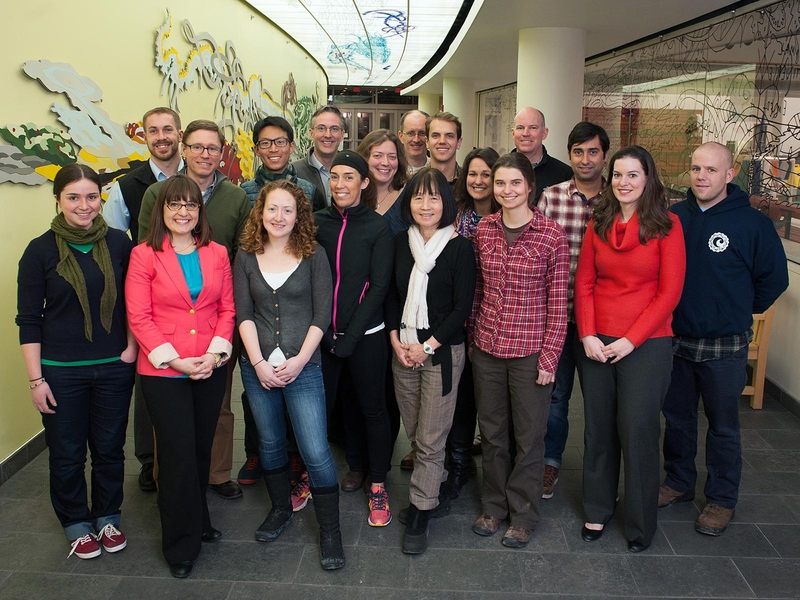
Caption:
MIT Strong had its first team meeting at the beginning of February. Runners who were able to attend included: (front, left to right) Maddie Hickman, Stephanie Kloos, Jen Gagner, Julie Pryor, volunteer coach Jane Wojcik, Sally Miller, Samantha Carney, John Cunniffe; (back, left to right) Tim Mertz, Tom Gearty, Stephen Shum, Jon Runstadler, Rachel DeLucas, Brian Mulcahey, Joseph Azzarelli, Sarah Lewis, Charlie Maher, Domingo Godoy.
Credits:
Photo: Andrew Kubica
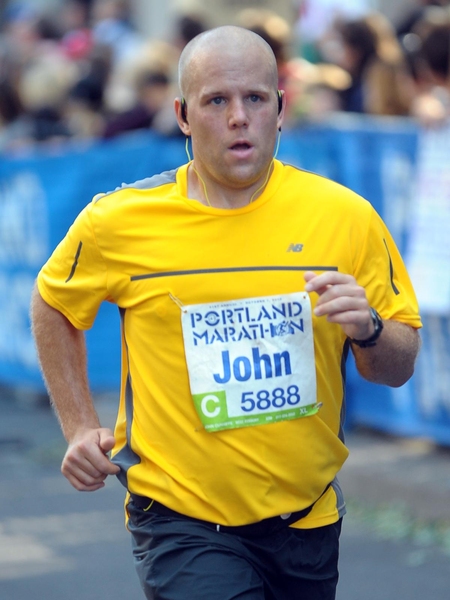
Caption:
John Cunniffe is a second class engineer in the Central Utility Plant at MIT. He was a half mile from the finish line last year when the bombs went off and did not get to finish.
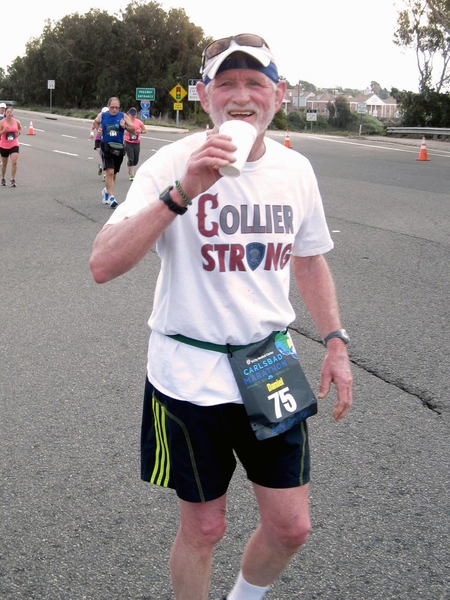
Caption:
Team member Dan Oliver '60 will travel from San Diego for this year's marathon. He says he knew immediately after the bombings that he would run Boston this year.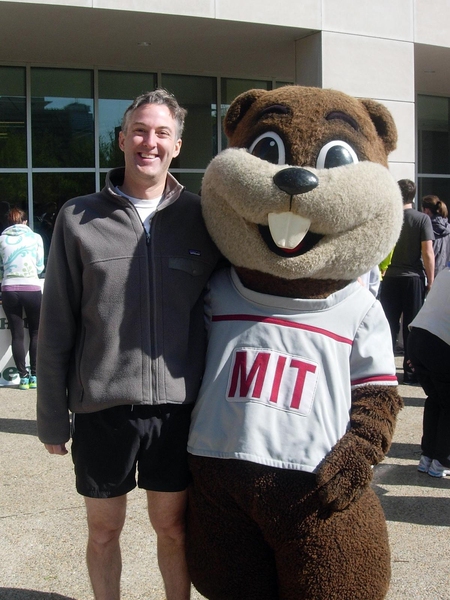
Caption:
Jonathan Runstadler, an assistant professor in the Department of Biological Engineering and the Division of Comparative Medicine, is one of several faculty running with the team.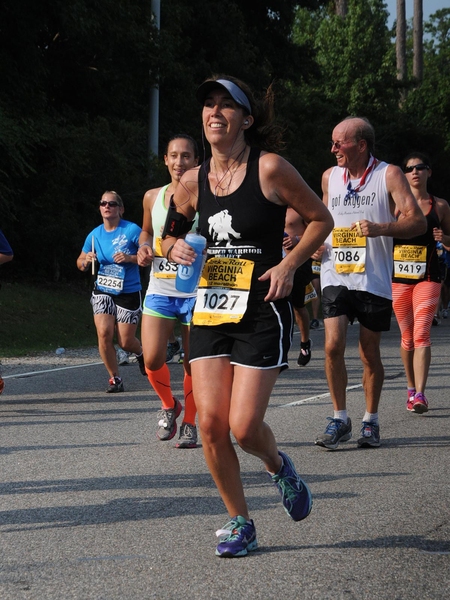
Caption:
Julie Pryor is a science writer at the McGovern Institute for Brain Research. "Running this marathon means representing the family who lost a son, a campus who lost its guardian, and a community that lost its way last April," she says.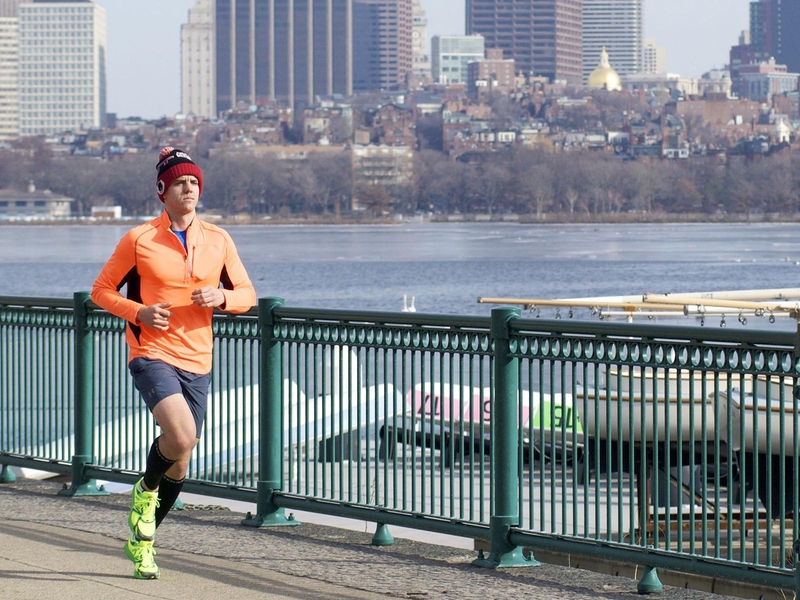
Caption:
Graduate student Joseph Azzarelli running along the Charles River at MIT. Azzarelli's research involves sensors to detect explosives.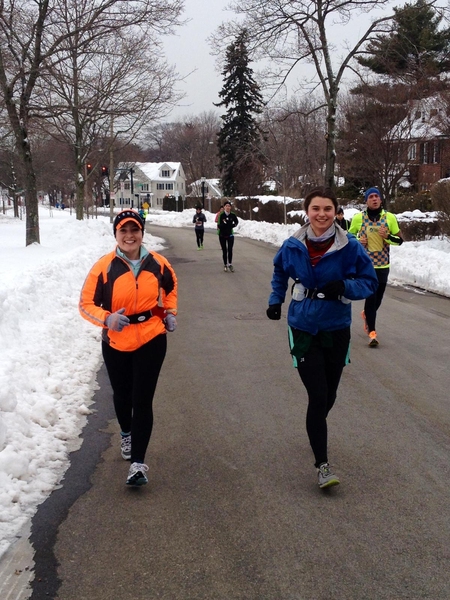
Caption:
The local members of the team are training through a rough winter. Here, Stephanie Kloos (left), the fitness director at the Zesiger Center, and Sally Miller, an MIT sophomore, brave the cold and hit the hills on the marathon course on a February training run.
Press Mentions
NECN
NECN’s John Moroney profiles the team from MIT running in this year’s Boston Marathon. The team, called MIT Strong, includes MIT faculty, staff, alumni, and students.
Related Topics
Related Articles
